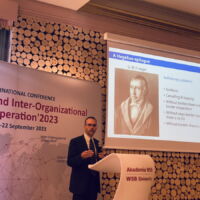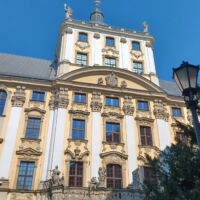Report on CESCI’s study tour to Liberec in 2023
Knowledge sharing | 27 September 2023
Knowledge sharing | 27 September 2023
Following its now tradition, the Central European Service for Cross-Border Initiatives organised a study trip between September 12-15, 2023, this time with the Liberec center as part of its services to its members. The Czech city, which provided also the accommodation for the participants, served as a starting point for getting to know the regional characteristics of the Czech-German-Polish triple border area, as well as regional cooperation experiences and good practices.
The first day was quite busy as the team reached its destination at the end of a nearly 600 km long journey. During the travel a longer stop was made in Malešov, near Kutná Horá, where the travellers visited the revived brewery of the former abbey building complex. In the late afternoon, the CESCI delegation went to the House of Europe, where the Czech-German-Polish Nisa Euroregion and the district of Liberec, located along the border, were presented. Pavel Branda, in his presentation as the project manager of the Nisa Euroregion – which brings together Czech-German-Polish local and regional municipalities – outlined the history of the formation of the Euroregion, the main development stages of the organisation, its structure, and its main regional development results (e.g. its own Small Project Fund, creation of working groups, cooperation covering an increasing number of thematic areas, joint management of environmental risks and pollution etc.). After that, Martin Půta, president of the Liberec district, president of the Nisa Euroregion, presented the district’s challenges and opportunities arising from its border location. He covered the characteristics of the local economic structure, commuting habits, and the negative impact of COVID-19 pandemic. During the trip, the cross-border environmental damage of the Polish open-pit coal mine, which ends at 200 meters from the Czech border, came up – not for the last time.
On the second day of the study trip, the members visited Hrádek nad Nisou, more specifically, its Uhelné part together with the deputy mayor, and the Mária chapel which had been renovated with the support of the Czech-German cooperation programme with the goal of creating a community space serving the cohesion of the local community in addition to the preservation of cultural heritage. The difficulties of cross-border projects were also discussed. After visiting the chapel, the journey led to the triple border point, which is a well-kept green area at the confluence of the Neisse and Lubota rivers, decorated with the flags of the three nations. Then the group visited the building on the main square of Hrádek, accompanied by the head of the town’s Support, Development and Culture Department. In a facility renovated with the use of INTERREG funds, the group visited, among other, the exhibition on border control and the history of smuggling. The team had lunch in the restaurant of Cvikov’s brewery after taking part in a tour in the brewery.
As part of the afternoon program, the delegation travelled to the town of Brniště, where they visited an eco-center serving educational, training and tourist purposes, which is a good example of cooperation between the local government, the corporate and civil spheres. Then they continued the journey along the forest route at the border of the settlement, where the members were able to see sculptures carved from sandstone and wood with the support of the German-Czech programme. After the walk in the forest and a short car journey, a trip was taken to Ještěd, the symbol of the region, from where the entire border area can be observed.
On the third day of the study trip, a very meaningful, several hour-long visit was organised to IQ Landia in Liberec, which operates as a science and technology park, and which was very popular among the participants. In addition to sharing knowledge and experience and networking, the center serves as a good practice for how a science center similar to the Palace of Miracles in Hungary can contribute to the development of children’s skills and abilities within the framework of non-school education. Some members started to think about how cooperation with the center could be developed. As the last program item, Hynek Böhm, assistant professor of the Geography Department of the Technical University of Liberec, member of the CESCI board, outlined how he sees the situation in the Liberec district and the triple border area and the cooperation between the parties. Lenka Strýčková, the deputy dean responsible for international relations of the university’s Faculty of Economics also met the group who presented the inter-university cooperation model, which had been established in 2001 with the participation of the Wrocław University of Science and Technology and is considered unique at the European level.
CESCI remains committed to organising new knowledge transfer and networking events for its members, thereby contributing to gaining experiences in other border regions, as well as the foundation of new partnerships.

 Borderlands facing a polycrisis in the 21st century, Resilience and future perspectives...
Borderlands facing a polycrisis in the 21st century, Resilience and future perspectives...